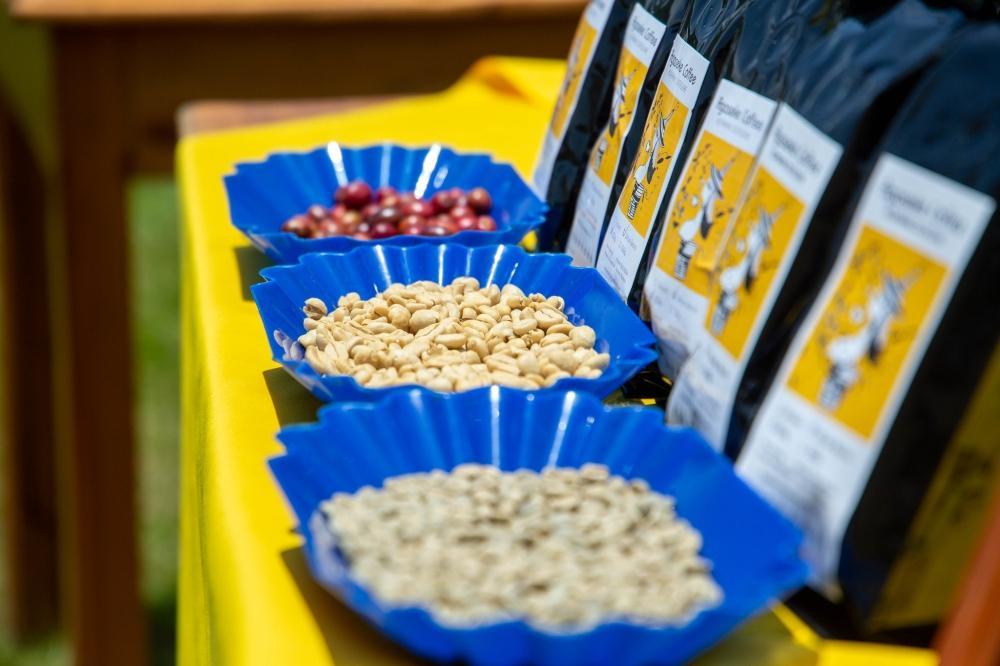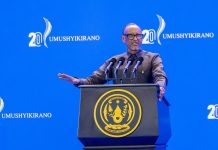Africa-Press – Rwanda. Rwanda earned slightly over $116 million (approx. Rwf168 billion) from coffee exports in the 2024/2025 fiscal year — a 48 per cent increase from $78.7 million recorded in the previous year, according to Claude Bizimana, Chief Executive Officer of the National Agricultural Export Development Board (NAEB).
The performance means that Rwanda has slightly surpassed its coffee export target to generate $115.5 million by 2029, under the Fifth Strategic Plan for Agriculture Transformation (PSTA 5), covering 2024/25 to 2028/29.
Bizimana made the announcement at a press conference on the performance and future prospects of Rwanda’s coffee sector, held in Kigali on November 7.
He attributed the strong performance to factors including a combination of higher production and better international prices.
“Coffee production reached about 21,000 tonnes, a 25 per cent increase compared to the previous year,” Bizimana said.
“At the same time, the average export price rose from $4.8 per kilogramme in 2023/24 to $5.66 in 2024/25, representing an 18 per cent increase, hence boosting revenues,” he said.
Bizimana said that Rwanda’s coffee sector has been undergoing significant transformation.
Compared to 2023/24, all key indicators including production, productivity, and export revenues improved, he observed.
The main drivers include the replacement of old coffee trees (that are 30 years old and above), introduction of new high-yielding and climate-resilient varieties, and expansion of plantations through private investment.
Reversing the 2023/24 decline
The rebound follows a 32 per cent decline in export revenues in 2023/24, when earnings fell to $78.7 million from $115.9 million the year before. The drop was driven by both lower volumes, down to 16,400 tonnes (a 17.9 per cent fall), and weaker global prices, which slipped from $5.78 per kilogramme in 2022/23 to $4.78 per kilogramme in 2023/24.
According to the Ministry of Agriculture and Animal Resources (MINAGRI), the downturn was largely due to climate change impacts and fluctuating global prices.
Rising farmer incomes
Oreste Baragahorana, Chairperson of the Coffee Exporters and Processors Association of Rwanda (CEPAR), highlighted that international price gains had a direct impact on farmers.
“The official farm-gate price for quality coffee cherries was set at Rwf600 per kilogramme, but on average, we paid Rwf900 per kilogramme,” he said.
He stated that when farmers earn more, they are motivated to produce more.
Showcasing Rwanda’s best coffee brands
Bizimana also pointed to the ‘Best of Rwanda’ competition launched in 2024 as a key initiative to promote excellence and market visibility. The competition recognises the country’s top coffee brands, which are later sold in online auctions to international buyers.
In 2024, the highest bid was $71.8 per kilogramme, won by NOVA Coffee Ltd from Gicumbi District, with the winning bidder being a US firm. The following year, the record rose to $88.18 (about Rwf130,000) per kilogramme, secured by K Organics from Huye District, with the winning bid coming from a buyer in the United Arab Emirates, Bizimana said.
Agnes Mukamushinja, owner of Nova Coffee, said the competition has boosted both visibility and sales.
“Our efforts to ensure quality along the entire value chain are paying off,” she said.
In October 2025, Mukamushinja told The New Times that this year, its coffee sales had already grown by about one-third compared to last year, and it projected an 80 increase by the end of the year.
Bizimana stated that such initiatives open up long-term opportunities for Rwandan farmers and exporters.
When international buyers participate in these auctions, he said, they often come back seeking long-term contracts with producers.
“This helps our farmers, cooperatives, and exporters secure stable markets and better prices,” he observed.
NAEB stated it continues to support private investors and farmers in accessing quality seedlings, controlling pests and diseases, and improving market intelligence to help them tap into new, higher-value markets.
For More News And Analysis About Rwanda Follow Africa-Press






